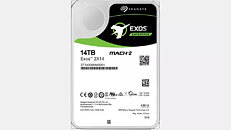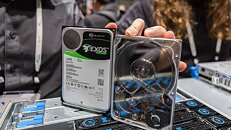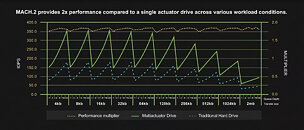Monday, May 24th 2021

Seagate Announces Seagate Mach.2 Exos 2X14 HDD With Up to 524 MB/s Sequential Speeds
Seagate has announced what currently amounts to the fasted HDD storage available in the market. The Seagate Mach.2 Exos 2X14 is available in a 14 TB capacity. What Seagate has, smartly, done, is integrate a dual 7 TB HDD system within a helium-filled 3.5" chassis. The drive features a standard 7200 RPM spindle speed, offers 256 MB cache, and uses a single-port SAS 12 Gb/s interface.The Exos 2X14 should be recognized by systems as two independently addressable logical drives.
Seagate's Exos 2X14 boasts a 524 MB/s sustained transfer rate (outer diameter) of 304/384 random read/write IOPS, and a 4.16 ms average latency - but of course, being an HDD solution with spinning platters and actuators, random performance still suffers tremendously against even its SATA SSD counterparts. Power consumption has understandable gone up for this solution - an Exos 2X14 drive consumes 7.2 W in idle mode and up to 13.5 W under heavy load. Seagate is offering its PowerBalance features integrated into the Exos 2X14, which aims to reduce its power consumption within the 12 W power envelope usually associated with 3.5" HDDs, but Seagate says this "does come with a performance reduction of 50% for sequential reads and 5%-10% for random reads." The need for higher IOPS-per-TB performance in their HDD space so as to allow datacenters to offer adequate performance for high-capacity storage continues to bear fruits.
Source:
Tom's Hardware
Seagate's Exos 2X14 boasts a 524 MB/s sustained transfer rate (outer diameter) of 304/384 random read/write IOPS, and a 4.16 ms average latency - but of course, being an HDD solution with spinning platters and actuators, random performance still suffers tremendously against even its SATA SSD counterparts. Power consumption has understandable gone up for this solution - an Exos 2X14 drive consumes 7.2 W in idle mode and up to 13.5 W under heavy load. Seagate is offering its PowerBalance features integrated into the Exos 2X14, which aims to reduce its power consumption within the 12 W power envelope usually associated with 3.5" HDDs, but Seagate says this "does come with a performance reduction of 50% for sequential reads and 5%-10% for random reads." The need for higher IOPS-per-TB performance in their HDD space so as to allow datacenters to offer adequate performance for high-capacity storage continues to bear fruits.



37 Comments on Seagate Announces Seagate Mach.2 Exos 2X14 HDD With Up to 524 MB/s Sequential Speeds
I lost trust in seagate as a brand in total; their faillure rate is so high and knowing i lost good data of myself once as well, i woud'nt want to bet on it. I used todo data recovery, most brands where obviously seagate followed with WD.
As much as people want to say platter drives are dinosaur tech, there is still plenty of stuff happening to make them better and there's things brought up all the time of how to advance them further. Solid state is just not there on the capacity side of things for datacenters, cloud, etc. that makes up a massive majority of WD and Seagate shipping volume.